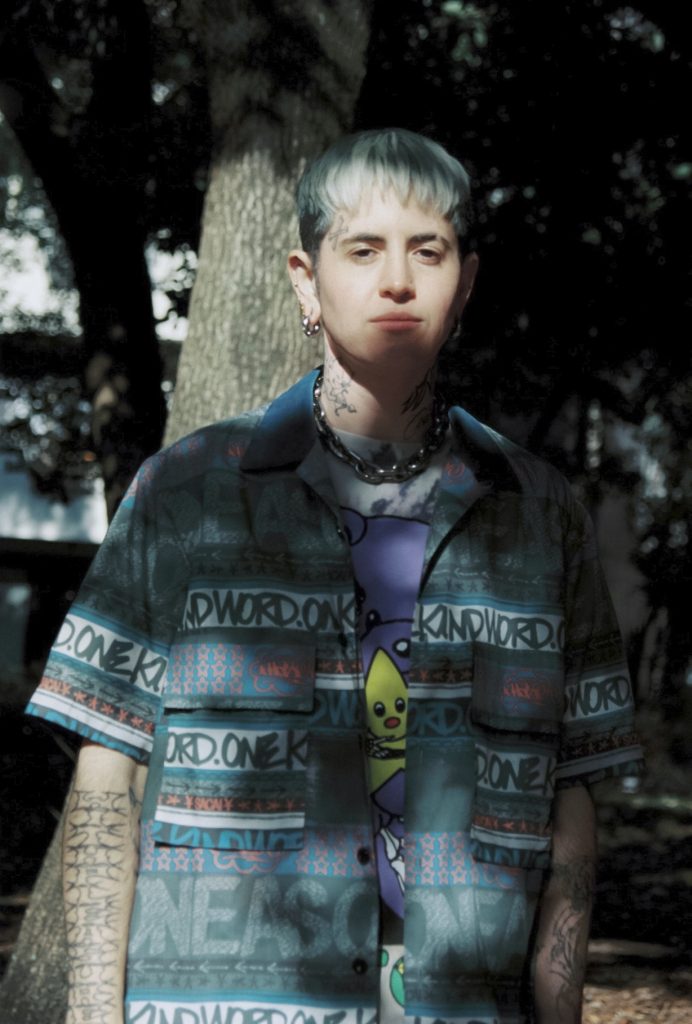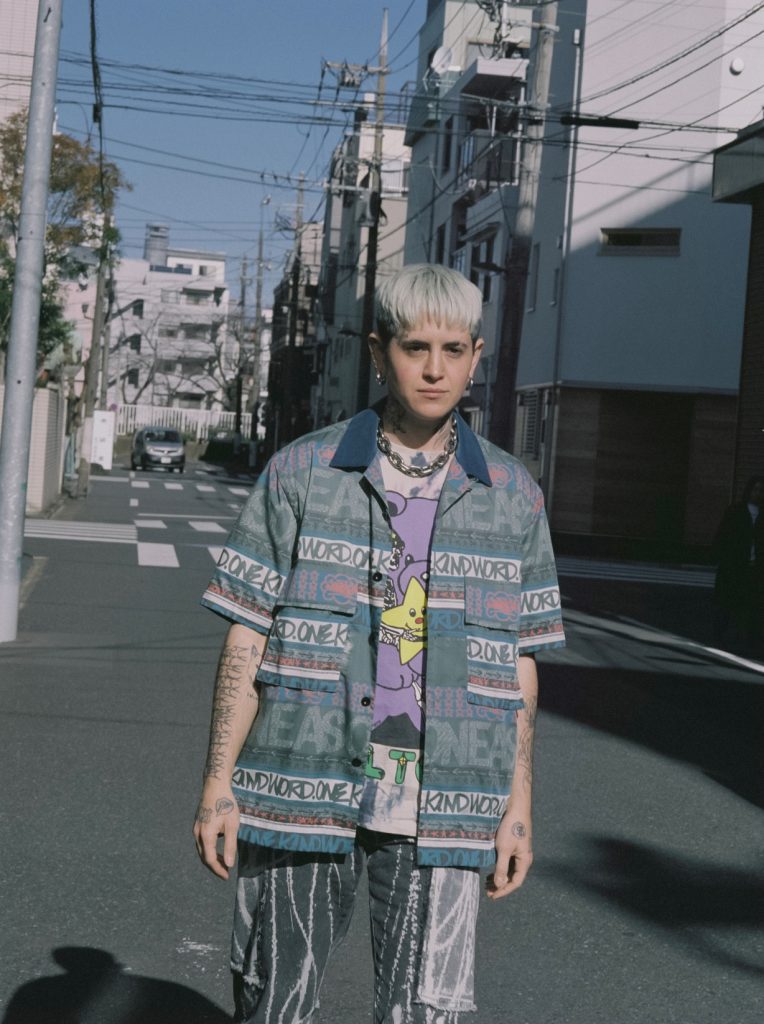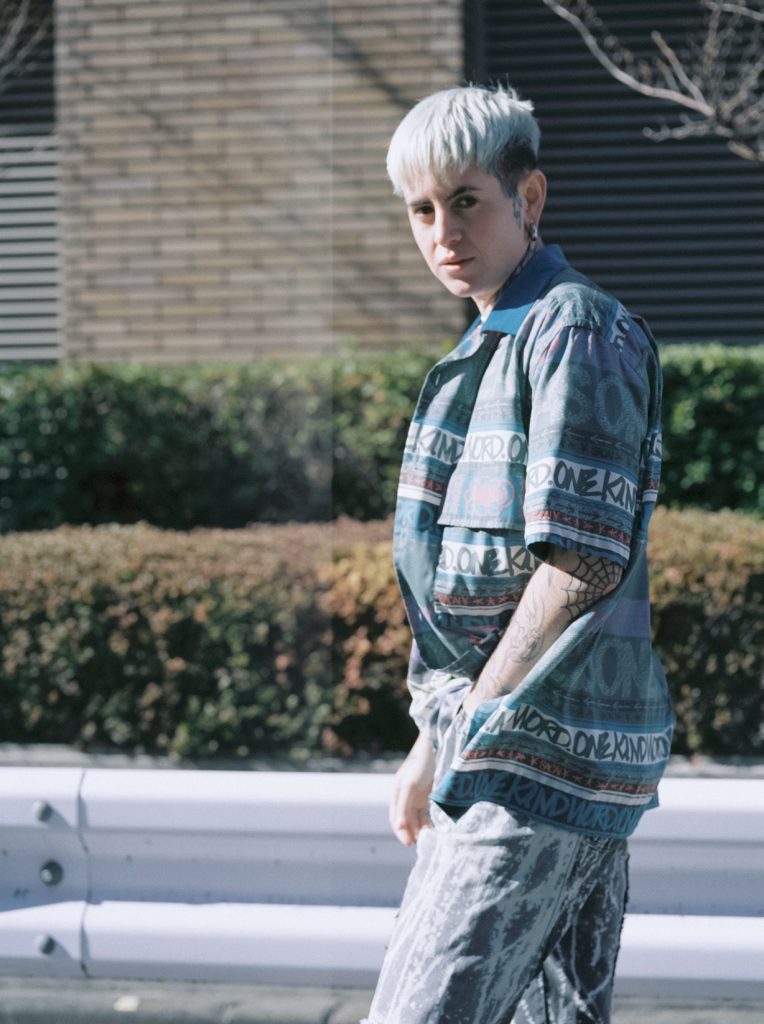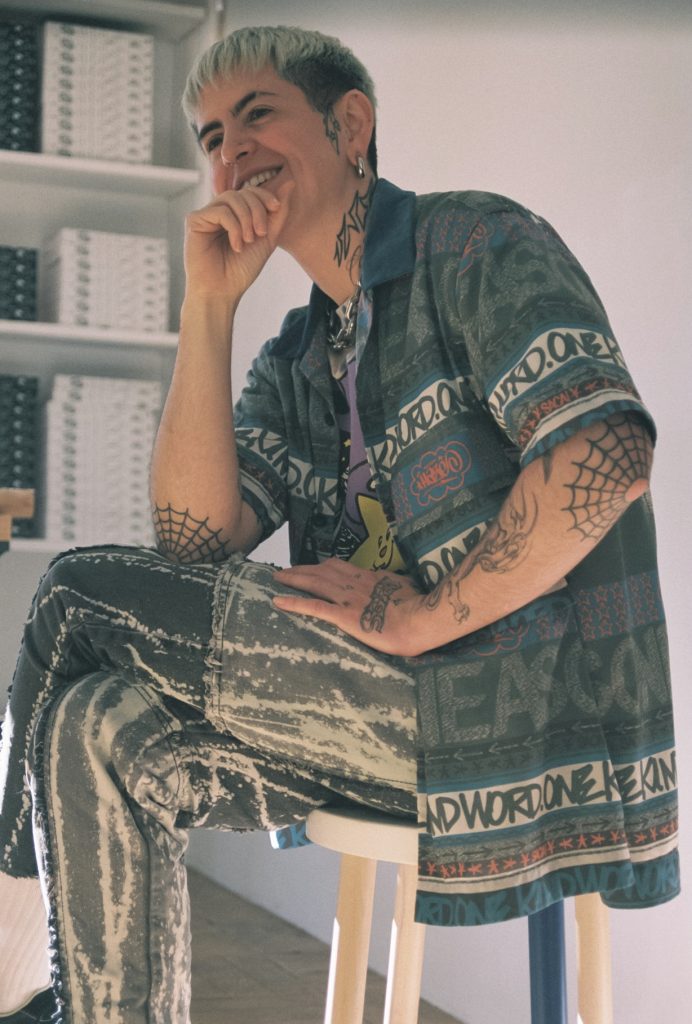June is referred to as “Pride Month” in a lot of countries, with many events held to raise awareness about LGBTQIA+ rights. The roots of Pride Month can be traced back to the Stonewall Riots (A series of resistance movements against the persecution of LGBTQIA+ people by the authorities), which began with a police raid on the Stonewall Inn, a gay bar in New York City, on June 28, 1969. Since then, many parties, researchers, and activists have invested a great deal of time and effort to advance the rights of the LGBTQIA+ communities.
British designer and creative director Aries Moross is one of them. Aries emerged at a young age with their energetic design works incorporating hand-drawn illustrations and lettering and has successfully led a number of big projects, centered on creative direction in the music industry. In addition, as a transgender person who has undergone gender-affirming procedures and the owner of their design studio, Studio Moross, Aries is a thought leader in the industry, speaking on various occasions to raise awareness about the LGBTQIA+ communities and to improve the working environment in the creative industry.
Besides, Aries has close ties with Japanese culture, having worked on many projects in Japan, collaborated with singer AI for her album Wa To Yo, and owns two Shiba Inu dogs. We asked Aries about various topics, such as their upbringing, sources of creativity, thoughts on Japanese culture, and even why they are politically outspoken. The second half of the interview explores their perception of Japanese culture, why and how they try to empower LGBTQIA+ communities.
The first part of the interview is available here.

Aries Moross
Aries Moross is a creative director, illustrator and designer. Moross began their career in 2007, illustrating hand drawn flyers for London’s independent music scene, and in 2008, established a vinyl only record label. Keen to expand their practice and build a team, they founded Studio Moross in 2012. Over the course of their career, they’ve maintained close ties to the music industry whilst expanding into the realm of both art and creative direction. Moross has taken on the role as creative director for a range of clients from pop artists to DJs, with projects spanning everything from album campaigns to live shows. Notable clients include Kylie Minogue, H.E.R, Disclosure, Spice Girls, Jessie Ware, and London Grammar. Aries also works in the live music sector as a show director, directing shows for Disclosure, London Grammar and Kylie Minogue.
http://www.ariesmoross.com
http://www.instagram.com/ariesmoross/
http://www.studiomoross.com
Japanese culture is about meeting the expectations of others

— I saw that you visited Enoura Observatory in Odawara earlier and made some drawings there. How did you find that place?
Aries Moross (Aries): That was the most beautiful place I’ve ever been. I found that incredibly profound. And I was very lucky because the weather was so clear. I think I needed to see the water. I needed to see the sky. I needed to see the stones. And I ate the mandarin oranges there.
— Sounds great. I know you are fond of Japanese culture. How did you develop your interest in it?
Aries: I’ve been working with The Bee’s Knees for 10 years now. So I have come to Japan, five or six times. The reason why I appreciate and respect Japanese culture so much is that ones expectation is met here. In the UK, you have this joke about expectation versus reality. But in Japan, your expectation is met in terms of the quality of your experience, the taste of the food, craftsmanship of the objects, the consideration of what you need, even down to something like just using a public restroom. It feels like Japanese people have thought about what the human experience is and have realized that it’s important to create experiences, objects, foods, things that are at a level of your fantasy. So that’s why I enjoy visiting just as an experience.
But then also, I found that I’ve had strong and deep friendships, connections and mutual appreciation with the people I’ve worked here. I went to visit my friend last week and had a lovely conversation with him. But it’s very rare for a foreigner to go to a country and have people take time to come and meet you and talk to you when they have busy lives and things to do. If something comes out of that meeting, it usually does because both people have the same intent and care for each other. And I think it’s rare to have care and the desire to make things together and make them well in the world of capitalism. I found that in Japan unlike any other country.
— Very interesting. I echo your perception in terms of how customers’ expectations are met here in Japan. But as a Japanese, I sometimes feel a kind of anxiety that there is something underneath this perfection.
Aries: I know my perception of Japanese culture is very superficial. I am not Japanese and have no understanding of what it is like to be a Japanese person, however, from interacting with Japan in business, I feel that. But of course, I’m sure that there are layers and layers and layers to it all, which I won’t comment on, because I don’t know what that is like. But I think there are, of course, challenges here for queer people, or for LGBTQIA+ people, even coming here as that person I experience challenges. And I think there is a lot of work we can do globally to help people who are not able to be themselves or living under the system of patriarchy or rules in society that are somewhat oppressive. And that’s something I’m very passionate about through my work.
Transness and the reason for being politically outspoken

— You mentioned previously that your transness or your queerness played a large part of your work. Can you share any example for that?
Aries: Yeah, it’s becoming more encouraged for projects that are around LGBTQIA+ topics, or TV shows or LGBT Pride-related projects to work with queer or trans-led companies to create them. So, I get a lot of phone calls in the summer to work on those kinds of projects. I think there’s a desire to make sure if the work is authentic. And, you know, my studio is queer-led, and I have a lot of queer and trans employees. For example, we created the identity for London LGBTQIA+ film festival called BFI FLARE organized by the British Film Institute. We make that identity every year amongst a team of queer people. We’ve worked on title sequence for the TV series RuPaul’s Drag Race, and other big projects around transness for Viacom and MTV.
Also, there’s a big desire now to diversify the teams working on projects, in general. So big corporate clients are having to have some accountability for the types of people they’re working with. And my team is a group of marginalized people who are making work together. So, people seek us out for that.
— Along with your creative works, you are having a lot of public talks on empowerment of the LGBTQIA+ communities and the working environments in creative industries. What motivates you to talk openly about that?
Aries: I think it’s important to be authentically yourself in your work. The people whom I admire and have admired in history have done that, whether they’re even if their identity was at odds with what was politically correct or acceptable at that time. And I also think it’s important for me as an older person to demonstrate or show that people can be successful in these industries, even if they are different, and that, even though there are challenges, they have role models and example of people who can navigate the world as women, as trans people, as queer people, because those things will give them motivation or faith that they can do it too.
And I want to improve my industry as a whole, because it has failures, like every other industry. There are areas that need improvement and development, whether that’s people being underpaid, whether that’s to do with racism in the workplace, shining a light on those things is very important to me. And I have the privilege of being well known and respected in my industry. So I have the opportunity to use that position to educate and inform other people on these things who are maybe not aware or need better education.
But yeah, I mean, it’s also who I am, so I can’t really hide it. I sometimes lose projects because of it. But that’s a choice that I make. I also get projects because of it. So, it’s like a two-way street.
— You have lost your project because of what you have talked?
Aries: Yeah, sometimes brands don’t want to be aligned with people who are politically outspoken. Also I’m sure there will be clients, now and in the future, who will not work with me because of my identity. I’ve noticed there is less interest on an international level about collaborations with me especially since I came out as trans, because I think big international brands tend to be more nervous about that type of named collaboration. They want to work with people who don’t cause issues in different territories or countries because in some countries, it’s still illegal to be gay. So yeah, I think there are commercial choices around collaboration.
Transgender policy and the positive impact of globalization

— In the previous public talk, you mentioned that your studio has a transgender policy. I was surprised that you have two weeks off for those who have taken a gender affirming procedure. Of course, majority of the Japanese company do not have that sort of clause in their policies. Can you share your thoughts on being a boss and developing an equitable policy for your employees?
Aries: It’s not common for majority of British companies as well. But I spend a lot of my time writing policies to make workplaces better, safer and more supportive for people. We have great policies for people who have kids. In the UK, for example, if you’re a father who has a child, you get only two weeks off from work, which means that women are persecuted in the workplace because they’re assumed if they have children, that they will not work for one year. So it’s unfair to both women and men. And it’s unfair to people who are not neither men or women. So we brought in new policies to make all of these practices better for everyone, regardless of their gender or sexuality. And yes, if you’re trans and you need to have a procedure, you should be allowed to take time off from your work, in the same way that people who have a broken leg are allowed to do so. If you have any problems or you need to work on something for yourself, you should be allowed to take time off to focus on it.
— You seem to be everyone’s ideal boss! Also, it feels that you need to be creative and innovative to make up policies like those.
Aries: I’d like to think that working in those areas is just as creative as anything else. Most of the time at work I’m making spreadsheets, which means I am always thinking about money, time, care and policy. And those things might not be very interesting to someone who’s at art school. But for me, that’s something I really enjoy about my job. And I find it very creative, and I get to work with my staff to make better things. They are not tangible, but they have a huge impact on people’s lives.
— Despite the fact that many companies in Japan have declared themselves to be LGBTQIA+ ally, the majority of LGBTQIA+ people feel that their companies do not have specific policies or systems to support them. So, do you have any advice or message for us?
Aries: Um, I think the key here is not to discriminate against LGBTQIA+ people. So those in the company should not prefer others over them just because of their identity. What we need is more LGBTQIA+ leaders, managers, and people who are in authority. It’s all about actually integrating everyone together and creating something that is representative of society. I have no idea what representative of Japanese society is, but certainly in the UK, a large proportion of the population identify themselves as LGBTQIA+ now. So, it’s important that those people are seen in management positions and in leadership roles, and that they’re just present, it’s a long process though.
But maybe globalization may have a positive impact in that respect, because we can share those issues globally. Obviously, globalization also has a negative impact. We need to protect culture and community, society and what we have created within our own communities. But as a global queer community, we can learn from one country that is doing it better than another. Maybe it’s something like mobilization of awareness. And that sort of perspective can be helpful for those who are living in a society where they are discriminated against, because they can look up and believe that there is a future for them in this world, or that there’s somewhere they can go that they feel safer, or they can be themselves. But I think it’s very hard to be yourself. It took me 30 years to work out who I am. But I finally became able to be myself, which I think is the most important.
— Thank you so much for sharing your invaluable insights and experiences. Your perspectives will definitely be helpful and inspiring not only for queer community in Japan but also for a wide variety of people pursuing careers in creative industry.
Aries: My pleasure. I hope Japanese readers will like it!
Photography: Yoko Kusano
Stylist: Megumi Yoshida
Special Thanks: Risa Nakazawa (The Bee’s Knees Inc.)
(Information for Aries’ style)
Shirt ¥48,400 / supplied by sacai (sacai: 03-6418-5977)
Any other items worn by Aries are of their own

